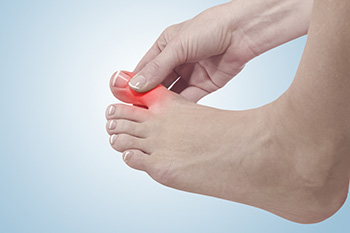Painful Sesamoiditis
Tuesday, 13 May 2025 00:00
Sesamoiditis is the inflammation of the sesamoid bones, two small, pea-shaped bones located beneath the big toe joint. These bones play a key role in absorbing pressure, reducing friction, and helping the big toe move during activities like walking, running, or dancing. When they become inflamed, it can cause significant discomfort. This condition often affects those who put repetitive stress on the ball of their foot, such as dancers, runners, or athletes. It can also develop in individuals with high arches or frequent high heel wearers. The primary symptom is pain beneath the big toe, which typically intensifies with activity and eases with rest. To manage sesamoiditis, reducing pressure on the affected area is key. Wearing cushioned shoes or custom orthotics can help alleviate pain, while rest and anti-inflammatory medication can provide pain relief. If pain persists or worsens, seeking professional care is an important step. A podiatrist can offer an accurate diagnosis and tailored treatment plan. If you have this painful condition, it is suggested that you schedule an appointment to see a podiatrist for relief and treatment solutions.
Sesamoiditis is an unpleasant foot condition characterized by pain in the balls of the feet. If you think you’re struggling with sesamoiditis, contact Dr. Anna Petrov of Family Foot & Ankle Care. Our doctor will treat your condition thoroughly and effectively.
Sesamoiditis
Sesamoiditis is a condition of the foot that affects the ball of the foot. It is more common in younger people than it is in older people. It can also occur with people who have begun a new exercise program, since their bodies are adjusting to the new physical regimen. Pain may also be caused by the inflammation of tendons surrounding the bones. It is important to seek treatment in its early stages because if you ignore the pain, this condition can lead to more serious problems such as severe irritation and bone fractures.
Causes of Sesamoiditis
- Sudden increase in activity
- Increase in physically strenuous movement without a proper warm up or build up
- Foot structure: those who have smaller, bonier feet or those with a high arch may be more susceptible
Treatment for sesamoiditis is non-invasive and simple. Doctors may recommend a strict rest period where the patient forgoes most physical activity. This will help give the patient time to heal their feet through limited activity. For serious cases, it is best to speak with your doctor to determine a treatment option that will help your specific needs.
If you have any questions please feel free to contact one of our offices located in Wheeling and Chicago, IL . We offer the newest diagnostic and treatment technologies for all your foot and ankle needs.







